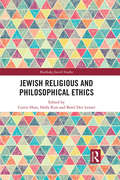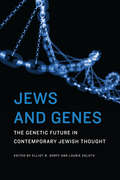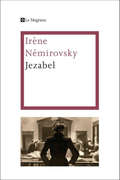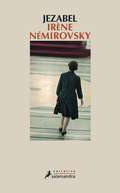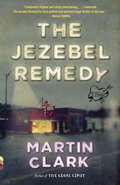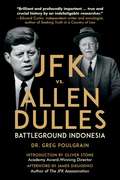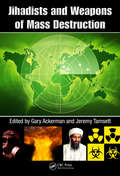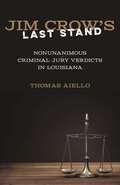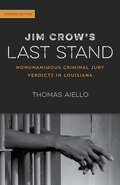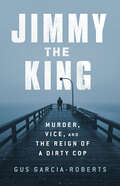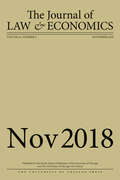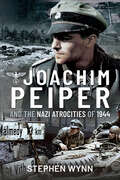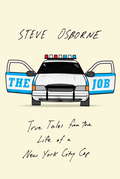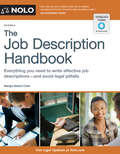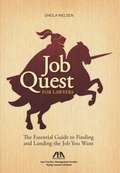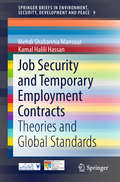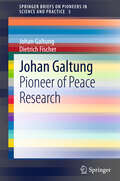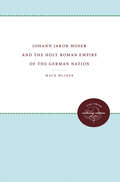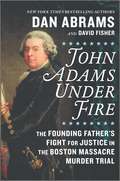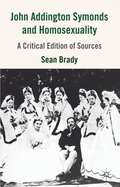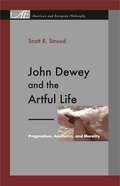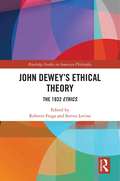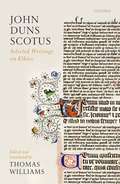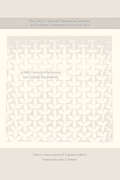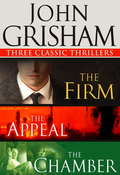- Table View
- List View
Jewish Religious and Philosophical Ethics (Routledge Jewish Studies Series)
by Halla Kim Curtis Hutt Berel Dov LernerTwentieth century continental thinkers such as Bergson, Levinas and Jonas have brought fresh and renewed attentions to Jewish ethics, yet it still remains fairly low profile in the Anglophone academic world. This collection of critical essays brings together the work of established and up-and-coming scholars from Israel, the United States, and around the world on the topic of Jewish religious and philosophical ethics. The chapters are broken into three main sections – Rabbinics, Philosophy, and Contemporary Challenges. The authors address, using a variety of research strategies, the work of both major and lesser-known figures in historical Jewish religious and philosophical traditions. The book discusses a wide variety of topics related to Jewish ethics, including "ethics and the Mishnah," "Afro Jewish ethics," "Jewish historiographical ethics," as well as the conceptual/philosophical foundations of the law and virtues in the work of Martin Buber, Hermann Cohen, and Baruch Spinoza.The volume closes with four contributions on present-day frontiers in Jewish ethics. As the first book to focus on the nature, scope and ramifications of the Jewish ethics at work in religious and philosophical contexts, this book will be of great interest to anyone studying Jewish Studies, Philosophy and Religion.
Jews and Genes: The Genetic Future in Contemporary Jewish Thought
by Rabbi Elliot N. Dorff Dr Laurie ZolothWell aware of Jews having once been the victims of Nazi eugenics policies, many Jews today have an ambivalent attitude toward new genetics and are understandably wary of genetic forms of identity and intervention. At the same time, the Jewish tradition is strongly committed to medical research designed to prevent or cure diseases. Jews and Genes explores this tension against the backdrop of various important developments in genetics and bioethics—new advances in stem cell research; genetic mapping, identity, testing, and intervention; and the role of religion and ethics in shaping public policy. Jews and Genes brings together leaders in their fields, from all walks of Judaism, to explore these most timely and intriguing topics—the intricacies of the genetic code and the wonders of life, along with cutting-edge science and the ethical issues it raises.
Jezabel
by Irène NémirovskyUn agut relat d'Irène Némirovsky, l'obra va ser acollida amb entusiasme no només a França: el New York Times la va considerar en el seu moment «la successora de Dostoievski» A la sala d’un tribunal se celebra el judici d'una dona. Gladys Eysenach ja no és jove, però ha estat molt bonica. Se l'acusa d'haver assassinat el seu amant, molt més jove que ella. Els testimonis van desfilant i l'advocat i el fiscal s'enfronten. Asseguda al recinte dels acusats, la protagonista sent fragments de la narració de la seva pròpia vida: la infantesa, l'exili, l'absència del pare, el matrimoni, les relacions tumultuoses amb la seva filla, l'edat i el declivi, fins a l'acte irreparable. Els membres del jurat i el públic remuguen, s'encenen. Però el culpable qui és? L'acusada? O el temps que fa bocins les il·lusions?
Jezabel
by Irène NémirovskyUn agudo relato de Irène Némirovsky, cuya obra fue acogida con entusiasmo no sólo en Francia: el New York Times la consideró en su día «la sucesora de Dostoievsky» Gladys Eysenach es acusada del asesinato de su presunto amante, un joven estudiante de apenas veinte años, y el caso levanta una enorme expectación en París. Madura y excepcionalmente bella para su edad, Gladys pertenece a esa alta sociedad apátrida que recorre Europa de fiesta en fiesta. Envidiada por las mujeres y deseada por los hombres, su vida se airea impúdicamente frente al juez: su infancia, el exilio, la ausencia del padre, su matrimonio, las difíciles relaciones con su hija, su fama de femme fatale, su fijación con la belleza y la juventud... El público, impaciente por conocer cada sórdido detalle, no comprende que la rica y envidiada Gladys, comprometida con un apuesto conde italiano, haya perdido la cabeza por un joven anodino, casi un niño. ¿Quién era la víctima: un amante despechado, un delincuente de poca monta o quizá el testigo incómodo de un secreto inconfesable? ¿Y por qué la acusada insiste en mostrarse culpable y exigir para sí misma un ejemplar castigo? La crítica ha dicho...«Un libro cristalino, feroz y prodigiosamente visionario en su tema central: el deseo de la eterna juventud.»La Repubblica «Un agudísimo retrato femenino, en el que Némirovsky plasma el desagrado que le inspiraba su propia madre, una mujer fría y narcisista.»Panorama «De ritmo veloz y gran dramatismo, nos permite vislumbrar un mundo de privilegios, riqueza y combate social darwinista en el periodo de entreguerras.»New Statesman
The Jezebel Remedy
by Martin ClarkMartin Clark--who has set, according to the Winston-Salem Journal, "the new standard by which other works of legal fiction should be judged"--now delivers his finest novel yet. Lisa and Joe Stone, married for twenty years and partners in their small law firm in Henry County, Virginia, handle less-than-glamorous cases, whether domestic disputes, personal injury settlements, or never-ending complaints from their cantankerous client Lettie VanSandt ("eccentric" by some accounts, "certifiable" by others). When Lettie dies in a freakish fire, the Stones think it's certainly possible that she was cooking meth in her trailer. But details soon emerge that lead them to question how "accidental" her demise actually was, and settling her peculiar estate becomes endlessly complicated. Before long, the Stones find themselves entangled in a corporate conspiracy that will require all their legal skills--not to mention some difficult ethical choices--for them to survive. Meanwhile, Lisa is desperately trying to shield Joe from a secret, dreadful error that she would give anything to erase, even as his career--and her own--hangs in the balance. In The Jezebel Remedy, Clark gives us a stunning portrait of a marriage, an intricate tour of the legal system, and a relentlessly entertaining story that is full of inventions, shocks, and understanding. This eBook edition includes a Reading Group Guide.
JFK vs. Allen Dulles: Battleground Indonesia
by Greg PoulgrainFor fans of conspiracy theories and JFK assassination theories, the untold story of Indonesia, gold, JFK, Allen Dulles, the CIA, and secret military coups. Two of the most fascinating figures in history, John F. Kennedy, thirty-fifth president of the United States, and Allen Dulles, our nation&’s longest-serving CIA director, often clashed over intelligence issues and national security. However, one such conflict has remained in the shadows until now. JFK vs. Allen Dulles: Battleground Indonesia takes reader to the vast archipelago 3350 miles wide where this secret showdown occurred. In 1936, an Allen Dulles-established company discovered the world's largest gold deposit in remote Netherlands New Guinea. In 1962, President Kennedy intervened, and Netherlands New Guinea was added to President Sukarno's Indonesia. Neither Sukarno nor JFK was aware of the gold, since Dulles had not informed Kennedy. Dulles planned a complicated and ruthless CIA regime-change strategy to seize control not only of Indonesia itself, but also of its vast resources, including the gold. This strategy included a push to start Malaysian Confrontation. Yet Kennedy's plan to visit Jakarta in early 1964 would have sunk Dulles' master plan, which included the destruction of the Indonesian communist party as a wedge to split Moscow and Beijing. Only an assassin's bullet put an end to Kennedy&’s plan of peace. Did Allen Dulles arrange for JFK to be killed to save his plan and his gold? Was his coup for gold successful with JFK out of the picture? Using archival records as a basis, Greg Poulgrain adds word-of-mouth evidence from those people who were directly involved—such as Dean Rusk and others who worked with President Kennedy and Allen Dulles at the time; or the person who was with Michael Rockefeller when he mysteriously disappeared in West New Guinea during this whole affair.
Jihadists and Weapons of Mass Destruction
by Gary Ackerman Jeremy TamsettExplores the Nexus Formed When Malevolent Actors Access Malignant MeansWritten for professionals, academics, and policymakers working at the forefront of counterterrorism efforts, Jihadists and Weapons of Mass Destruction is an authoritative and comprehensive work addressing the threat of weapons of mass destruction (WMD) in the hands of jihadists,
Jim Crow's Last Stand: Nonunanimous Criminal Jury Verdicts in Louisiana
by Thomas AielloThe last remnant of the racist Redeemer agenda in the Louisiana's legal system, the nonunanimous jury-verdict law permits juries to convict criminal defendants with only ten out of twelve votes. A legal oddity among southern states, the ordinance has survived multiple challenges since its ratification in 1880. Despite the law's long history, few are aware of its existence, its original purpose, or its modern consequences. At a time when Louisiana's penal system has fallen under national scrutiny, Jim Crow's Last Stand presents a timely, penetrating, and concise look at the history of this law's origins and its troubling legacy. The nonunanimous jury-verdict law originally allowed a guilty verdict with only nine juror votes, funneling many of those convicted into the state's burgeoning convict lease system. Yet the law remained on the books well after convict leasing ended. Historian Thomas Aiello describes the origins of the statute in Bourbon Louisiana-a period when white Democrats sought to redeem their state after Reconstruction-its survival through the civil rights era of the 1950s and 1960s, and the Supreme Court's decision in Johnson v. Louisiana (1972), which narrowly validated the state's criminal conviction policy. Spanning over a hundred years of Louisiana law and history, Jim Crow's Last Stand investigates the ways in which legal policies and patterns of incarceration contribute to a new form of racial inequality.
Jim Crow’s Last Stand: Nonunanimous Criminal Jury Verdicts in Louisiana
by Thomas AielloA remnant of the racist post-Reconstruction Redeemer sociopolitical agenda, Louisiana’s nonunanimous jury-verdict law permitted juries to convict criminal defendants with only nine, and later ten, out of twelve votes: a legal oddity. On the surface, it was meant to speed convictions. In practice, the law funneled many convicts—especially African Americans—into Louisiana’s burgeoning convict lease system. Although it faced multiple legal challenges through the years, the law endured well after convict leasing had ended. Few were aware of its existence, let alone its original purpose. In fact, the original publication of Jim Crow’s Last Stand was one of the first attempts to call attention to the historical injustice caused by this law. This updated edition of Jim Crow’s Last Stand unpacks the origins of the statute in Bourbon Louisiana, traces its survival through the civil rights era, and ends with the successful effort to overturn the nonunanimous jury practice, a policy that officially went into effect on January 1, 2019.
Jimmy the King: Murder, Vice, and the Reign of a Dirty Cop
by Gus Garcia-RobertsAn incredible four-decade account of murder, power, and corruption in one of the country&’s largest police departments In 1979, the gruesome slaying of a thirteen-year-old boy riveted the suburbs of Suffolk County, New York. As the county hustled to bring the case to a dubious resolution, a wayward local teenager emerged with a convenient story to tell. For his cooperation, Jimmy Burke was rewarded with a job as a cop.Thus began Burke&’s unlikely ascent to the top of one of the country&’s largest law enforcement jurisdictions. He and a crew of likeminded allies utilized vengeance, gangster tactics, and political leverage to become the most powerful and feared figures in their suburban empire.Until a pilfered bag of sex toys brought it all crashing down.Jimmy the King is the story of the rise, reign, and paranoiac fall of a corrupt cop and his regime—a crime family with badges and guaranteed pensions. Novelistic in detail and piercing in its political insight, this book will leave you questioning who modern policing serves, who it protects, and who it preys upon and abandons.
JLE vol 61 num 4
by The University of Chicago PressThis is volume 61 issue 4 of The Journal of Law and Economics. Established in 1958, the Journal of Law and Economics publishes research on a broad range of topics, including the economic analysis of law, the economic analysis of regulation and the behavior of regulated firms, industrial organization and antitrust policy, the political economy of legislation and legislative processes, law and finance, and corporate finance and governance. The JLE has published some of the most influential and widely cited articles in these areas. It is an invaluable resource for academics and those interested in cutting-edge analysis of current public policy issues.
Joachim Peiper and the Nazi Atrocities of 1944
by Stephen WynnJoachim Peiper held the rank of Obersturmbannführer in Nazi Germany’s fanatical Schutzstaffel, more commonly referred to as the SS. He spent the first two years of the war as an adjutant to the Reichsführer of the Schutzstaffel, and leading member of the Nazi Party, Heinrich Himmler, where he would have witnessed at first hand the construction and implementation of numerous SS policies, many of which would have been in relation to ethnic cleansing and the Holocaust. In October 1941, having yearned for a chance at combat, he changed roles and became a commander in the Waffen-SS, although he still remained in regular contact with Himmler. As a member of the 1st SS Panzer Division Leibstandarte, he saw service in the Soviet Union, Italy and Belgium. On 19 September 1943, he and his men were responsible for the murder of twenty-four Italian civilians at the village of Boves. On 17 December 1944, men under his command were responsible for what became known as the Malmedy massacre, involving the murder of eighty-four unarmed American prisoners of war. Following this, between 17 and 20 December, Peiper and his men were involved in the murder of a number of other American soldiers, as well as Belgian civilians. Peiper was never charged with the atrocities at Boves, but in 1946 he faced an American military tribunal for the Malmedy masssacre. Although found guilty and sentenced to death, his sentence was reduced to life imprisonment but he was eventually released in 1956. In 1972, Peiper moved to the French village of Troves in north east France. On 14 July 1976, his home was attacked and set on fire. Overcome by smoke, he died in the flames.
The Job
by Steve Osborne"HOW YA DOIN'?" With these four syllables, delivered in an unmistakably authentic New York accent, Steve Osborne has riveted thousands of people at the legendary storytelling venue The Moth (and many tens of thousands more via YouTube) with his hilarious, profane, and touching tales from his twenty years as an NYPD street cop. Steve Osborne is the real deal, people: the tough, streetwise New York cop of your dreams, one with a big, big heart. Kojak? NYPD Blue? Law & Order? Fuggedaboudem! The Job blows them out of the water. Steve Osborne has seen a thing or two in his years in the NYPD--some harmless, some definitely not. In "Stakeout," Steve and his partner mistake a Manhattan dentist for an armed robbery suspect, and reduce the man to a puddle of snot and tears when questioning him. In "Mug Shot," the mother of a suspected criminal makes a strange request and provides a sobering reminder of the humanity at stake in his profession. And in "Home," the image of Steve's family provides the adrenaline he needs to fight for his life when assaulted by two armed and violent crackheads. From stories about his days as a rookie cop to the time spent patrolling in the Anti-Crime Unit--and his visceral, harrowing recollections of working during the weeks after 9/11--The Job: True Tales from the Life of a New York City Cop captures the humanity, the absurdity, and the dark humor of police work, as well as the bravery of those who do it. These stories will speak to those nostalgic for the New York City of the 1980s and '90s, a bygone era when the city was a crazier, more dangerous (and possibly more interesting) place.From the Hardcover edition.
Job Description Handbook, The
by Margie Mader-ClarkEverything you need to define the job, step by step Every job has a description -- and if you craft it carefully, you can use a job description for effective hiring, new employee orientation, evaluating performances, discipline and plan for future growth. But if it's poorly written (or not written at all), your company can face all sorts of problems, from low employee morale to legal troubles. To meet your company's changing needs, The Job Description Handbook, an all-in-one resource, can help you create HR documents that provide the details of every job's duties, requirements, qualifications -- and much more. This book, written in Nolo's signature plain-English style, will help you: -create a good job description -hire qualified employees -evaluate an employee's job performance -plan for your company's future needs -avoid legal traps -troubleshoot a description The book also provides checklists, worksheets, resources, sample language and step-by-step instructions that you can use to create job descriptions that will work in the real world.
Job Quest for Lawyers: The Essential Guide to Finding and Landing the Job You Want
by Sheila NielsenThis book provides step-by-step guidance that finally makes networking inspiring instead of a chore. The "quest" motif applies to each stage of the job search. The book demystifies networking by including illustrations from the author's own experiences and from the stories of her clients that provide examples of the real world do's and don'ts of how to conduct a productive job search.
Job Security and Temporary Employment Contracts: Theories and Global Standards (SpringerBriefs in Environment, Security, Development and Peace #9)
by Mehdi Shabannia Mansour Kamal Halili HassanThis book discusses the need of a legal protection at national and global levels to address the use of temporary employment contracts by employers. Chapter 1 reviews some theories of job security, showing how job security issues should be regulated in labour laws to protect workers and also how temporary contracts affect job security. Chapter 2 examines legal protection of job security in temporary contract in international contexts where it examines the concept and need for job security and job protection especially for temporary contracts based on three United Nations’ instruments, namely, the Universal Declaration of Human Rights (UDHR), International Covenant on Civil and Political Rights (ICCPR), and International Covenant on Economic, Social and Cultural Rights (ICESCR). Chapter 3 studies the ILO standards in relation to job security and temporary contracts as well as those covered by the Philadelphia Declaration and other conventions and recommendations. Chapter 4 discusses Islamic jurisprudence on jobs and job security. The main aims of this chapter is to provide the framework for protecting workers as a means to enhance job security in the world especially in Islam. It discusses Islamic jurisprudence concerning work and job conditions. The Islamic precept is based on the Qur’an and Hadith and these sources are used to explain the concept of jobs in Islam. In addition, this chapter also examines the Cairo Declaration on Human Rights in Islam (CDHRI).
Johan Galtung
by Dietrich Fischer Johan GaltungThis is the first ever anthology of key articles by Johan Galtung, widely regarded as the founder of the academic discipline of peace studies. It covers such concepts as direct, structural and cultural violence; theories of conflict, development, civilization and peace; peaceful conflict transformation; peace education; mediation; reconciliation; a life-sustaining economy; macro-history; deep culture and deep structure; and social science methodology. Galtung has contributed original research, concepts and theories to more than 20 social science disciplines, including sociology, international relations and future studies, and has also applied his new insights in practice. The book is a valuable resource for researchers and practitioners, and can serve as a supplemental textbook for graduate and upper undergraduate courses in peace studies and related fields.
Johann Jakob Moser and the Holy Roman Empire of the German Nation
by Mack WalkerAs the most learned and eminent public lawyer in Germany, a busy administrator, and a prolific writer, Moser (1701-85) lived and breathed the political order. His correspondence, memoranda, and manuscript autobiography reflect the intricate day-to-day operations of the empire, and his fascinating life is a microcosm of the life and style of the empire itself. The biography provided a comprehensive picture of the empire between the Thirty Years War and the revolutionary era.Originally published 1981.A UNC Press Enduring Edition -- UNC Press Enduring Editions use the latest in digital technology to make available again books from our distinguished backlist that were previously out of print. These editions are published unaltered from the original, and are presented in affordable paperback formats, bringing readers both historical and cultural value.
John Adams Under Fire: The Founding Father's Fight for Justice in the Boston Massacre Murder Trial
by David Fisher Dan AbramsThe New York Times bestselling author of Lincoln’s Last Trial and host of LivePD Dan Abrams and David Fisher tell the story of a trial that would change history. <P><P>History remembers John Adams as a Founding Father and our country’s second president. But in the tense years before the American Revolution, he was still just a lawyer, fighting for justice in one of the most explosive murder trials of the era.On the night of March 5, 1770, shots were fired by British soldiers on the streets of Boston, killing five civilians. <P><P>The Boston Massacre has often been called the first shots of the American Revolution. As John Adams would later remember, “On that night the formation of American independence was born.” Yet when the British soldiers faced trial, the young lawyer Adams was determined that they receive a fair one. He volunteered to represent them, keeping the peace in a powder keg of a colony, and in the process created some of the foundations of what would become United States law. <P><P>In this book, New York Times bestselling authors Dan Abrams and David Fisher draw on the trial transcript, using Adams’s own words to transport readers to colonial Boston, a city roiling with rebellion, where British military forces and American colonists lived side by side, waiting for the spark that would start a war. <P><P><b>A New York Times Bestseller</b>
John Addington Symonds (1840–1893) and Homosexuality
by Sean BradyIn John Addington Symonds (1840 1893) and Homosexuality: A Critical Edition of Sources, Sean Brady brings together for the first time the correspondence between John Addington Symonds and Havelock Ellis on the project of Sexual Inversion. Ellis'Sexual Inversion became eventually his totemic Studies in the Psychology of Sex. But in many respects, the project Sexual Inversion was Symonds' brainchild. Ellis and Symonds never actually met, so the correspondence represents their completecommunication on the subject. Many of the letters in this critical source edition are published here for the first time, and the correspondence in its entirely has never been published together. This critical source edition also publishes Symonds' original privately printed essays, 'A Problem in Greek Ethics', and 'A Problem in Modern Ethics'. Sean Brady's critical introduction provides a new and interdisciplinary analysis of the significance of these texts, the correspondence, and of Symonds' place in the history of ideas and of gender and sexuality. This volume is an indispensable reference for a wide range of scholars working across multidisciplinary fields of inquiry that focus on British and continental histories of medicine and sexuality, gender history and studies of nineteenth-century culture, and introduces the new reader to Symonds' life and ideas on homosexuality. "
John Dewey and the Artful Life: Pragmatism, Aesthetics, and Morality (American and European Philosophy #7)
by Scott R. StroudAesthetic experience has had a long and contentious history in the Western intellectual tradition. Following Kant and Hegel, a human’s interaction with nature or art frequently has been conceptualized as separate from issues of practical activity or moral value. This book examines how art can be seen as a way of moral cultivation. Scott Stroud uses the thought of the American pragmatist John Dewey to argue that art and the aesthetic have a close connection to morality. Dewey gives us a way to reconceptualize our ideas of ends, means, and experience so as to locate the moral value of aesthetic experience in the experience of absorption itself, as well as in the experience of reflective attention evoked by an art object.
John Dewey’s Ethical Theory: The 1932 Ethics (Routledge Studies in American Philosophy)
by Roberto FregaThis book provides a wide-ranging, systematic, and comprehensive approach to the moral philosophy of John Dewey, one of the most important philosophers of the 20th century. It does so by focusing on his greatest achievement in this field: the Ethics he jointly published with James Hayden Tufts in 1908 and then republished in a heavily revised version in 1932. The essays in this volume are divided into two distinct parts. The first features essays that provide a running commentary on the chapters of the 1932 Ethics written by Dewey. Each chapter is introduced, situated within a historical perspective, and then its main achievements are highlighted and discussed. The second part of the book interprets the Ethics and demonstrates its contemporary relevance and vitality. The essays in this part situate the Ethics in the broader interpretive frameworks of Dewey’s philosophy, American pragmatism, and 20th-century moral theory at large. Taken together, these essays show that, far from being a mere survey of moral theories, the 1932 Ethics presents the theoretical highpoint in Dewey’s thinking about moral philosophy. This book features contributions by some of the most influential Dewey scholars from North America and Europe. It will be of keen interest to scholars and students of American pragmatism, ethics and moral philosophy, and the history of 20th-century philosophy.
John Duns Scotus: Selected Writings On Ethics
by Thomas WilliamsThomas Williams presents the most extensive collection of John Duns Scotus's work on ethics and moral psychology available in English. John Duns Scotus: Selected Writings on Ethics includes extended discussions-and as far as possible, complete questions-on divine and human freedom, the moral attributes of God, the relationship between will and intellect, moral and intellectual virtue, practical reasoning, charity, the metaphysics of goodness and rightness, the various acts, affections, and passions of the will, justice, the natural law, sin, marriage and divorce, the justification for private property, and lying and perjury.
The John F. Sonnett Memorial Lectures at Fordham University School of Law: A Half-Century of Advocacy and Judicial Perspectives
by Dennis J. Kenny Joel E. Davidson John D. FeerickThis book represents the distinguished Sonnett lecture series sponsored by Fordham’s Law School that has taken place for the last 45 years. In this collection, U.S. Supreme Court Justices, a Lord Chancellor of England, three Chief Justices of Ireland, a Chief Justice of South Africa, a President of the Supreme Court of Israel, and other leading judges and lawyers examine common law–based legal systems and underlying principles. The lectures encourage attorneys and society to improve the training of lawyers, respect the independence of the judiciary, place ethics at the forefront, question the efficacy of the criminal justice system, and explore the complex philosophical issues facing the judiciary.Taken as a whole, these lectures are a prescription for improvements and innovations throughout the legal system. The lectures were delivered by judges and lawyers who were involved in many of the most significant cases of the last half-century that strengthened individual rights and promoted access to justice. Each finds its deepest meaning in advancing the theme of Fordham Law School: “In the Service of Others.”
John Grisham (3-Book Bundle): The Firm, The Appeal, The Chamber
by John GrishamThe #1 New York Times bestselling master of legal suspense, John Grisham has electrified readers with his white-knuckle narratives for more than two decades. Assembled here in a convenient eBook bundle are three of his classic thrillers: The Firm, the runaway hit that ignited his writing career, The Appeal, and The Chamber. Read back-to-back or enjoyed separately, these edge-of-your-seat novels show why John Grisham is--beyond a reasonable doubt--one of the most beloved authors of all time. THE FIRM When Mitch McDeere signed on with Bendini, Lambert & Locke of Memphis, he thought that he and his beautiful wife, Abby, were on their way. The firm leased him a BMW, paid off his school loans, arranged a mortgage, and hired the McDeeres a decorator. Mitch should have remembered what his brother Ray--doing fifteen years in a Tennessee jail--already knew: You never get nothing for nothing. Now the FBI has the lowdown on Mitch's firm and needs his help. Mitch is caught between a rock and a hard place, with no choice--if he wants to live. THE APPEAL In a crowded courtroom in Mississippi, a jury returns a shocking verdict against a chemical company accused of dumping toxic waste into a small town's water supply, causing the worst "cancer cluster" in history. The company appeals to the Mississippi Supreme Court, whose nine justices will one day either approve the verdict--or reverse it. The chemical company is owned by a Wall Street predator named Carl Trudeau, and Mr. Trudeau is convinced the Court is not friendly enough to his interests. With judicial elections looming, he decides to try to purchase himself a seat on the Court. The cost is a few million dollars, a drop in the bucket for a billionaire like Mr. Trudeau. Through an intricate web of conspiracy and deceit, his political operatives recruit a young, unsuspecting candidate. They finance him, manipulate him, market him, and mold him into a potential Supreme Court justice. Their Supreme Court justice. THE CHAMBER In Chicago's top law firm, a young lawyer stands on the brink of a brilliant career. Now twenty-six-year-old Adam Hall is risking it all for a death-row killer and an impossible case: Sam Cayhall is a former Klansman and unrepentant racist facing the death penalty for a fatal bombing in 1967. Cayhall has run out of chances--except for one: a determined lawyer who just happens to be his grandson. While the executioners prepare the gas chamber, while the protesters gather, and while the TV cameras wait, Adam has only days, hours, minutes to save his client. For between the two men is a chasm of shame, family lies, and secrets--including the one secret that could save Sam Cayhall's life . . . or cost Adam his.
